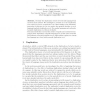Free Online Productivity Tools
i2Speak
i2Symbol
i2OCR
iTex2Img
iWeb2Print
iWeb2Shot
i2Type
iPdf2Split
iPdf2Merge
i2Bopomofo
i2Arabic
i2Style
i2Image
i2PDF
iLatex2Rtf
Sci2ools
110
click to vote
DLT
2007
2007
Duplication Roots
Recently the duplication closure of words and languages has received much interest. We investigate a reversal of it: the duplication root reduces a word to a square-free one. After stating a few elementary properties of this type of root, we explore the question whether or not a language has finite duplication root. For regular languages and uniformly bounded duplication root this is decidable. The main result then concerns the closure of regular and context-free languages under duplication. Regular languages are closed under bounded and uniformly bounded duplication root, while neither regular nor contextfree language are closed under general duplication root. 1 Duplication A mutation, which occurs in DNA strands, is the duplication of a factor inside a strand. The interpretation of this as an operation on a string has inspired much recent work in Formal Languages, most prominently the duplication closure. The duplication closure of a word was introduced by Dassow et al. [6], who sho...
DLT 2007 | Duplication Closure | Duplication Root | Theoretical Computer Science | finite Duplication Root |
Related Content
| Added | 29 Oct 2010 |
| Updated | 29 Oct 2010 |
| Type | Conference |
| Year | 2007 |
| Where | DLT |
| Authors | Peter Leupold |
Comments (0)

